Shared workspaces
4/5/2023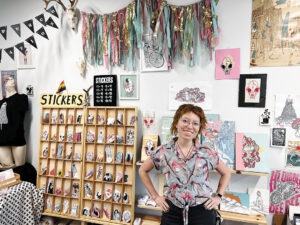
Maddy Fusco, a Des Moines-based freelance illustrator, works out of her studio in Mainframe Studios. Photo by Colson Thayer
Maddy Fusco is a freelance illustrator in Des Moines. When she began her career, she primarily worked out of her home. However, as time went on, she needed some work-life separation. For some, the change to a work-from-home lifestyle because of COVID was a blessing in disguise; for Fusco, it was a different story.
“Getting out of my bedroom is honestly just the best thing ever because having that separation and having a designated space where I can create art or go over inventory… it’s been a real game changer,” she said.
Fusco found a small studio in downtown Des Moines. The building was still a work in progress, but it had promise. Gradually, it began to fill out. Now, it holds more than 200 professionals across several industries, but they all utilize a shared workplace.
Mainframe Studios
900 Keosauqua Way, Des Moines
mainframestudios.org
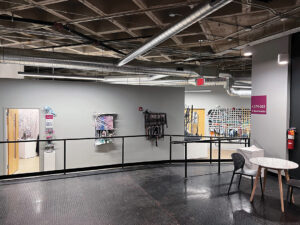
Third floor at Mainframe Studios. Photo by Colson Thayer
Des Moines’ Mainframe Studios is comprised of 180 studios and operates at 100% capacity. Some of the studios double up, meaning there are more than 200 artists in the space.
But what’s unique about Mainframe is that it is exclusively for artists. Having recently finished the second floor, Mainframe Studios is the nation’s largest nonprofit creative workplace. Within the walls are the traditional artists — like those who use paints, pencils, cameras and clay — but there are also nontraditional artists who design toys, blow glass, create storyboards for Warner Brothers, and work for Marvel Comics.
“We weren’t afraid to think big, and a demand study early on proved that we could fill a building this size,” said Siobhan Spain, executive director of Mainframe Studios.
Spain joined the project early on because she believed in the concept: to provide affordable workspaces for artists. She started in her role when the building was purchased in 2015 and has been there since. The idea was ambitious, and it wasn’t until two years later that artists began to fill the studios.

Siobhan Spain is the executive director of Mainframe Studios in Des Moines. Photo courtesy of Spain
To make this dream a reality, the nonprofit had to secure funding from some of Des Moines’ biggest names: the Lauridsen family, QuikTrip, Meredith Corporation, Fred and Emily Weitz, Fred and Charlotte Hubbell, among others. The funding was used to purchase the building and complete the build-out.
So, how affordable is it? The average studio rent at Mainframe is $1 per square foot per month. That rent comes with 24/7 access to the building, Wi-Fi, heating and cooling. There are three tiers when it comes to pricing: the first tier includes studios that have “half-walls” that don’t reach the ceiling, for less than $1 per square foot; the second tier has full walls but without windows and is just more than $1 per square foot; the highest tier has full walls and windows for about $1.15 per square foot.
But the real luxury for tenants is having access to 200 other artists in the building. Together, they can exchange ideas, network and collaborate.
“Artists really get inspired by each other, and it’s not from the same mediums oftentimes,” Spain said. “It’s just putting them under one roof, and it happens organically.”
One way artists meet is through Mainframe’s “First Fridays” events. On the first Friday of each month, Mainframe opens its doors to the public to hold what can be described as a farmer’s market for artists.
“It’s a great way to make a connection with people and other artists,” Fusco said. “It’s a great way to let the public know that artists have things to sell and allows the artists to become aware of one another.”
Mainframe Studios reached its initial goal and brought artists to downtown Des Moines. But their work isn’t finished. The next steps include partnering with community organizations like the Boys & Girls Club and getting the word out about the space and its mission.
“Our original vision has been realized, and that’s why we had to do strategic planning in order to see what is next on the horizon,” said Spain.
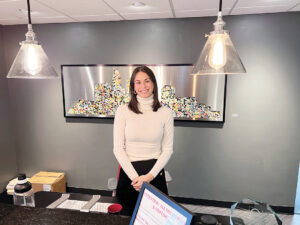
Jackie Bassman is the operations manager at Collaborate DSM. Photo by Colson Thayer
Collaborate DSM
3106 Ingersoll Ave., Des Moines
collaboratedsm.com
Six years ago, Jackie Bassman and her husband, Clinton Akerberg, were riding their bikes down Ingersoll Avenue. Along the way, Akerberg noticed a for-lease sign outside one of the buildings. It was his entrepreneurial spirit that led him to tell Bassman that this was his next business venture.
What had been on Akerberg’s mind was to bring a coworking space to Des Moines. Akerberg got the idea from a friend who was managing one in Denver.
Bassman described lackluster nationwide chains as “cookie cutter” and thought they could do something different.
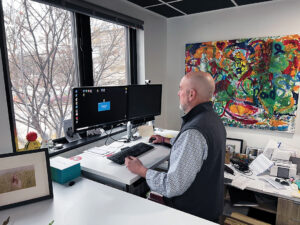
Joel Drake with Wealth Consulting Group works out of a private suite inside Collaborate DSM. Photo by Colson Thayer
“We wanted to fill that void and provide a more flexible and fun professional solution,” said Bassman, now the operations manager at Collaborate DSM. “We’re kind of looking to offer a space for established or new professionals to work in a flexible environment.”
Collaborate DSM houses a wide variety of members. Forty-five members represent nearly 30 different businesses including a yoga instructor, mental health therapists, a marketing company, attorneys and nonprofits.
Those interested in the space can purchase various membership plans, including a co-working membership, designated desk, private suites and a virtual membership. The co-working membership allows members to work from anywhere they like, Monday through Friday, 8 a.m. to 5 p.m. for $150 a month on a month-to-month basis. The designated desk membership is more suitable for those who need a dedicated workspace, as it includes a locked filing cabinet, desk and a chair for $250 a month with a three-month minimum. Private suites start at $650 a month for 100 square feet and go up to 450 square feet with a 12-month minimum. Virtual members are allowed access to the facilities, one co-working day per month, and a discounted conference room rental for $50 per month. However, the primary use of the virtual membership is to use the Ingersoll location as a mailing address for a business.
The space offers an on-site gym, a coffee and tea bar, a beer keg, dog-friendly spaces, large conference rooms, audio/visual equipment, free parking and printing. They also host members-only events like happy hours and lunches. Bassman said these events “bring camaraderie and conversation.”
“People are naturally really collaborative in these walls,” said Bassman.
With terminology like collaborating and co-working, you would think that the space boosts networking and cross-industry teamwork. However, the numbers share a different story.
“Ninety percent of our business is private office suites and then designated desks. So, people have their own space. We only have a handful of coworking members,” Bassman said.
Joel Drake with Wealth Consulting Group moved from a private office in West Des Moines to work in a private office within Collaborate DSM.
When the building first opened, Drake was seeing his physical therapist, Addie Anderson, at Collaborate DSM. A few years later, he joined Wealth Consulting Group and was placed in their Collaborate DSM office. It took him four years to learn that Clinton Akerberg, Collaborate DSM’s co-founder, was also a financial advisor.
“I’d come in, sit down, go see Addie and then leave,” Drake said. “I don’t need to be that guy where I’m trying to drum up business, I’d rather be friends.”
The jury is still out on whether Collaborate DSM is truly a collaboration space or just a collection of offices.
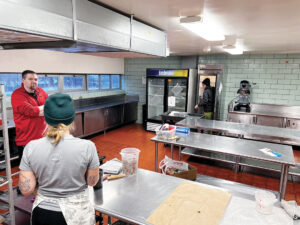
More than 20 small food businesses use the commercial-grade kitchen at the Mickle Center Shared-Use Kitchen. Photo by Colson Thayer
Mickle Center Shared-Use Kitchen
1620 Pleasant St., Des Moines
wallace.org/community-kitchen
“Our mission with the Mickle Center Kitchen is to incubate small businesses,” said Kitchen Manager Mary Kapler. “My goal is to kick you out.”
The Neighborhood Investment Corporation invested in the Mickle Center to offer affordable workspaces to businesses and organizations. Upstairs houses a variety of office-type work; meanwhile, downstairs is a commercial kitchen that is used by more than 20 food businesses.
Shared-use commercial kitchens are not a new concept — but they are to Iowa. The idea is to provide startup food businesses with an affordable place to prep, cook and package goods for sale. The main things the Mickle Center Kitchen offers to its businesses are time and space.
“That kitchen can produce a lot of food,” Kapler said. “We can have easily two businesses working at the same time. Their space is divided… There is no working on the same piece of equipment or same table.”
The kitchen charges $20 per hour to cook/prep and $10 per hour when packaging. There are low-cost charges for long-term dry and refrigerated storage.
Kapler’s primary job is to help businesses get off their feet and navigate how to operate a food business.
“A big part of my job is often educating the businesses on food safety regulations, because that’s not something people just normally know,” said Kapler. “I’d say quite a few that come into this space don’t have a background in food.”
Before anyone can use the space, they have to spend $450 on a license and $150 for a Food Protection Manager certificate. That’s $600 before they can turn a profit. Kapler said only the ones who are passionate about their business make it that far.
The low overhead costs for the use of the facility help businesses cut down on unnecessary expenses.
“We take care of the stuff they don’t have to take care of. We take care of the sanitation, the garbage, recycling. We give all the inspections,” said Kapler. “We’ve purchased the equipment, the coolers, the freezers, the mixers. They don’t have that cost… They can focus on building their business.”
Kapler said their current number of 23 businesses is optimal for operation. The businesses simply need to email Kapler with their tentative schedules to request time and space in the kitchen. But, as the farmers market season quickly approaches, so does the busy season at the Mickle Center Kitchen.
Kapler said there is a need for more of these spaces. “We need them in West Des Moines, we need one in Ankeny, we need one south of town.” ♦





















